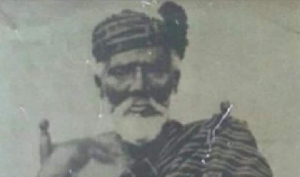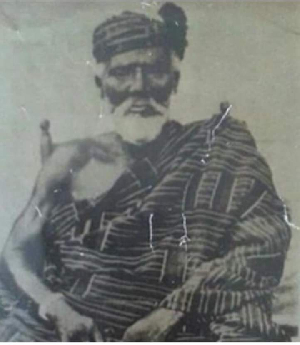
Abiasuma Nii Tackie Tawiah l, King of the Ga land, reigned during the "Golden years" of Accra (1862-1902).

He was born in 1817 as Nii Kwashie Tawiah at Kinka (Ushertown, Accra). His father was Nii Teiko Doku (a merchant) from a Ga Royal family of Teiko Tsuru we, son of King Teiko Tsuru and mother was Naa Ashong Danso from Asere (a quarter in Accra).
He attended the Wesley Methodist School in Accra for his basic education. After completion of basic education, he started life as a business man and his knack in the Gold Coast (Ghana) trade and commercial terrain made him a Merchant Prince.
He traveled to Tamale, Akropong-Akwapem and Kumasi to trade. He also traveled to Togo, Sierra Leone, Nigeria and Fernando Po (now Bioko Island) in Equatorial Guinea to transact business and made friends with people from the Caribbean, and South America.
King Tackie Tawiah l, was enstooled on 12th September 1862, as the Twentieth king of the Ga state in an unbroken line of royal descent.
He succeeded King Yaote who ruled from 1858 to 1862.
Throughout his reign, King Tackie Tawiah l, demonstrated an extraordinary sense of statesmanship and fairness by seeking the welfare of his people. His love and sympathy knew no bounds. Kind, gentle and undaunted, he led his people through many difficulties.
King Tackie Tawiah l, was always ready to follow the advice of his cabinet. He could neither be influenced with money nor with political pressure; his sense of probity was beyond question.
King Tackie Tawiah l, was always ready to intercede for, and defend, the right the oppressed. He led his Ga warriors to march with the combined forces of the British, Ada, Akyem and Akwapim against the Anlos and their Ashanti allies in the Vovo, Duffor and Clover Wars.
He was an independent thinker who stood on his grounds against threats, thus, when the British made presentations to him to assist them alongside Nana Asafo-Agyei of Juaben to invade the Ashanti kingdom during the reign of Asantehene (King) Mensa Bonsu, to claim the Golden Stool, he declined and British Colonial Governor Hodgson described him as an “uncooperative King”. As a result he was exiled to Elmina (Ghana) from November 1880 to 10 March 1883 due to what the British described as the King`s “persistent disobedience of the order of the British government.”
During that period, his cabinet resolved that the King could be exiled but not the stool and that " the King never dies." Several popular songs were composed by the people of Accra to express their dedication to Abiasuma Nii Tackie Tawiah I.
He returned to Ga Mashie (Accra Central) in a great procession to continue his reign after he was released (pardoned) on 10 March 1883.
His reign witnessed the translation of the Bible into Ga language in 1865 (The first indigenous Ghanaian language to be formalized -1764) and the transfer of the administrative capital of Gold Coast (Ghana) from Cape Coast to Accra by the British Colonial Government on 19 March 1877.
The reign of Abiasuma Nii Tackie Tawiah I, lasted for forty years, making him the second longest after of Nii Tetteh Ahinakwa who reigned from 1740 to 1782.
In 1997, The Kanda Flyover in Accra was named after him.
On 23 September 2002, a giant effigy of him was unveiled at the Accra central business district near the Makola Shopping Mall in honour of his great achievements. The effigy has the inscription “The Statue of the Late King Tackie Tawiah I” and is engraved with an emblem of an elephant with a deer standing on it, and a hand with a white bracelet pointing to the sky.
The statue symbolizes peace, stability and fairness that he stood for during his reign from 1862-1902.
Abiasuma Nii Tackie Tawiah I, featured on Ghana stamp which was issued during the centenary celebration of the Accra Metropolitan Assembly (AMA) in 1998. Making him the second Ghanaian King to be featured on stamp after the Ashanti King "Asantehene" Prempeh I.
He lived to 85 years and reigned 40 years. Therefore, when he lie on his bed people would sometimes think he was dead and then they will ask whether his still alive and the news will be "he's still alive" and the people began to call him "abia-nsuma" which means a cup full of water - in other words, he is full of life and he still reigns, hence, "Abiasuma" became a praise title to subsequent Ga Kings.